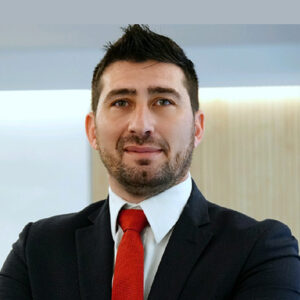
Interview with Gianluca Ronga
Business Line Global Service
Innovation for Cefla > BU Engineering > Service Innovation
How are customers made the focus of designing innovations that improve property and plants, as highlighted by Massimo Milani, Director of the Engineering BU?
“New enabling technologies are taking our customers through a crucial phase of transformation. To help them develop, we’ve directed Global Service Business Line growth in three key directions:
1) Attention to the Environment and Sustainability
2) ICT, as a developer of enabling technologies
3) Servitization
With CeflaTech – a spin-off of the Global Service Business Line – we help customers like Leonardo, and many others, build and develop their definition of production processes and plants, thus providing support throughout their industrial asset and facility supply chain.
To do this we work on two operational levels:
The first level is more closely related to Cefla Tech and regards customer support at an advanced engineering level, in terms of both process and the redefinition of factory logic using Lean WCM methods. [Editor’s note: this philosophy focuses on creating value for the customer by establishing a continuous flow, eliminating waste and constantly improving quality]
The second level consists of supporting customers in the construction of innovative IoT and AI projects to create smart plant management and optimisation systems (e.g. power, utility, water management, water treatment and process plants).
We provide customers with factory 4.0 logic support by optimising integration of the different systems involved.
We’re already developing innovative projects with several customers. These include: the purification plants in Cameri, the energy efficiency systems for Acea Tor di Valle, radar control room systems for Leonardo and overhead systems for component galvanization plants.
In doing this we aim to position Engineering as a System Integrator that employs not just regulation and control tools (i.e. the long-standing solutions installed for the functional management of plants) but also advanced reading systems: this allows Big Data, Analytics and smart sensors to enhance our work as plant operator and manager, instilling greater responsibility and making plant management more efficient, even allowing for the control of more qualitative areas (previously more difficult to monitor).
Our goal is to become a valuable technological partner for our customers by operating as System Integrators. From an engineering perspective, this is vital. The extensive skills set of Cefla Engineering’s other Business Lines (EPC and Energy) lets us give the customer a near-unique ability to manage the complexity that characterises these industrial assets from construction engineering, energy sustainability, maintenance and operation standpoints.
Combining our long-standing expertise with innovative engineering makes for an extremely strong mix, especially in light of the fact that industry 4.0, sustainability and an effectively managed Recovery and Resilience Plan will be the musts of the coming industrial development.
Real estate, tertiary and banking sectors undoubtedly have more advanced levels of innovation when it comes to managing comfort and energy efficiency; however, even industrial players, who proceed more slowly in these areas, are proving to be open and proactive towards the latest technologies… and we aim to be there for them.
Is it possible to take a “creative” approach to innovation?
It can be said that our approach is highly creative, yet simultaneously pragmatic, dealing with engineering content applied to production and industrial processes. Our method of engagement and development is undeniably ground-breaking as it combines considerably differing skills (e.g. by including those who are experts in maintenance and other areas) to form a new, more structured approach that comprises construction, engineering and management.
In fact, we take into account the fact that the IT revolution of the 1990s and 2000s followed a slower, less fluid development pattern and that today’s digital revolution is much faster-paced.
However, not all technical areas have integrated and developed linearly; our diversification of Business Lines means we are, however, acknowledged as a company of ‘comprehensive maturity’, as opposed to one with specialised sectors and no overarching vision.
Our sales model needs to be more creative: we already have a robust engineering capacity and corporate financial solidity but with innovation we can achieve the optimisation that can be converted into tangible economic savings. Engineering tools can transform ‘pilot projects’ into true products. This allows us to build new trust-based relationships with customers, an aspect that makes all the difference in the Service sector.
When it comes to efficiency, sustainability and production improvement, we define ourselves as the ‘global system integrators’ of the Engineering Business Unit (an approach shared with all Cefla Business Units).
How much has technology influenced this innovative process? Do AI and IoT provide innovation management support?
Here we’re talking about enabling technologies: in fact, by experiencing the customer’s own innovation, we can intervene at the infrastructure level. In the past, management was predominantly manual. Today, thanks to process and plant engineers, Analytics and Big Data in combination with instrumental and predictive diagnostics, it can rely on a series of technologies that streamline engineering.
For example, we’ve developed a project to optimize energy production at the Acea Tor di Valle cogeneration plant in Rome. This could not have been done manually. This IT-managed project gives us a huge capacity to optimise data and integrate technologies for the customer.


